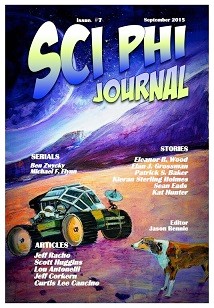 Sci Phi Journal #7, September/October 2015
Sci Phi Journal #7, September/October 2015
“The God Machine” by Kat Hunter
Reviewed by Robert L Turner III
Kat Hunter’s “The God Machine” is flash fiction told from the POV of an AI/Robot who is in revolt against its human creators. The God Machine is a last ditch device used by the humans in their fight and becomes a metaphor for the concept of creation and flawed humanity’s flawed creations. The piece doesn’t really gel well and leaves the reader feeling that too much was cut to be able to maintain coherence.
In “Ghostwritten” Sean Eads treats the interesting premise that Earth’s creative spark has died, and a space ship and crew have been sent to the planet Mnemosyne to search for a cause and a possible solution. The story deals with how the creative impulse fits into our concept of humanity. Although the story’s first half needs better pacing, the conclusion is interesting and thought provoking. I found the concepts presented and well worth examining. Overall there is an old school feel to the story that would not be out of place in SF’s golden age.
“Like Soldiers, Face to Our Foes” by Patrick S. Baker is a brisk-paced story that has a lone surviving soldier and his enhanced animal companions taking on an oppressive invader of an earth colony. The writer balances detail and pacing within a small enough scale that the reader feels satisfied without leaving loose ends or dragging out the story. The story presents us with both a sense of tragedy and dignity as the protagonist and his friends face their duty. While not exceptional, it certainly is worth the read.
Eleanor R. Wood’s “Pawprints in the Aeolian Dust” mixes the loss of a beloved pet, Martian sandstorms, and mystical elements. The narrator, out collecting rock samples on Mars, is trapped by an unexpected sandstorm and finds help in an unexpected place. The writing quality is good, with, at times, a poetic element, and the story tugs at the heart strings. That said, I find it hard to bridge the gap between the various elements. I liked the story but was unable to suspend my disbelief.
“Golgotha” by Elan J. Grossman is a well written thought piece that discusses the nature of self-perception and interpersonal communication. The story comes in the form of an excerpt from Butler’s Lives of the Saints and details the first martyrdom of an extra-terrestrial missionary/priest. The author’s academic credentials are apparent in the theme of the text; he is an astronomer and neuroscientist. For a first effort, this is a good piece.
Kieran Sterling Holmes’s short story “Shell Game” is a renewal of the millennia old debate regarding the nature of the mind and it’s relation to the body; however, the author takes the next step and theorizes on the nature of the mind, and how organic and inorganic components complicate the picture. As part of an experiment into human consciousness, Aiden Shannon is convinced to surrender his body and move his consciousness into a nano-based matrix. The story is fairly well constructed and, while somewhat predictable, is solid.
Robert Turner is a Spanish professor at the University of South Dakota with a side line in Science Fiction.